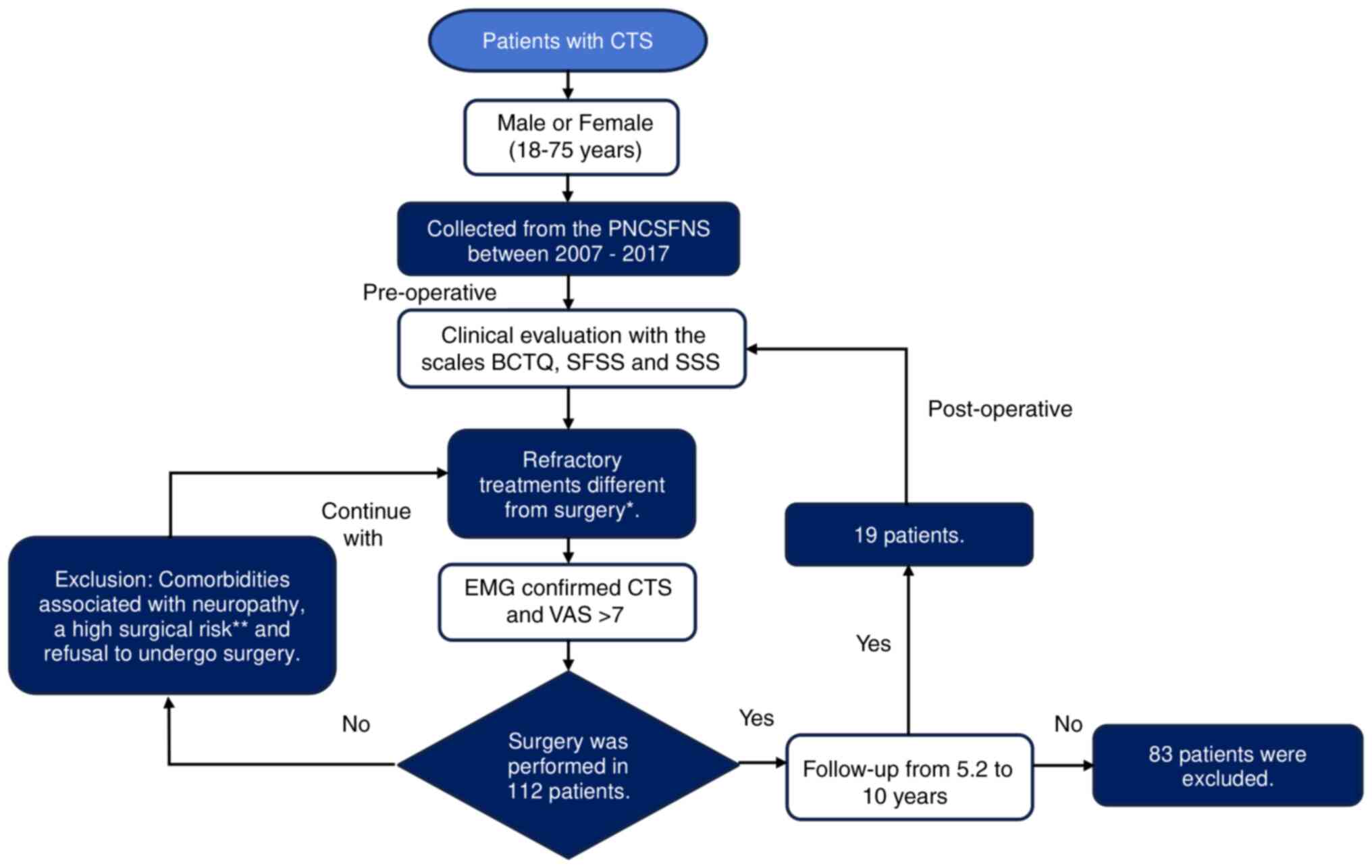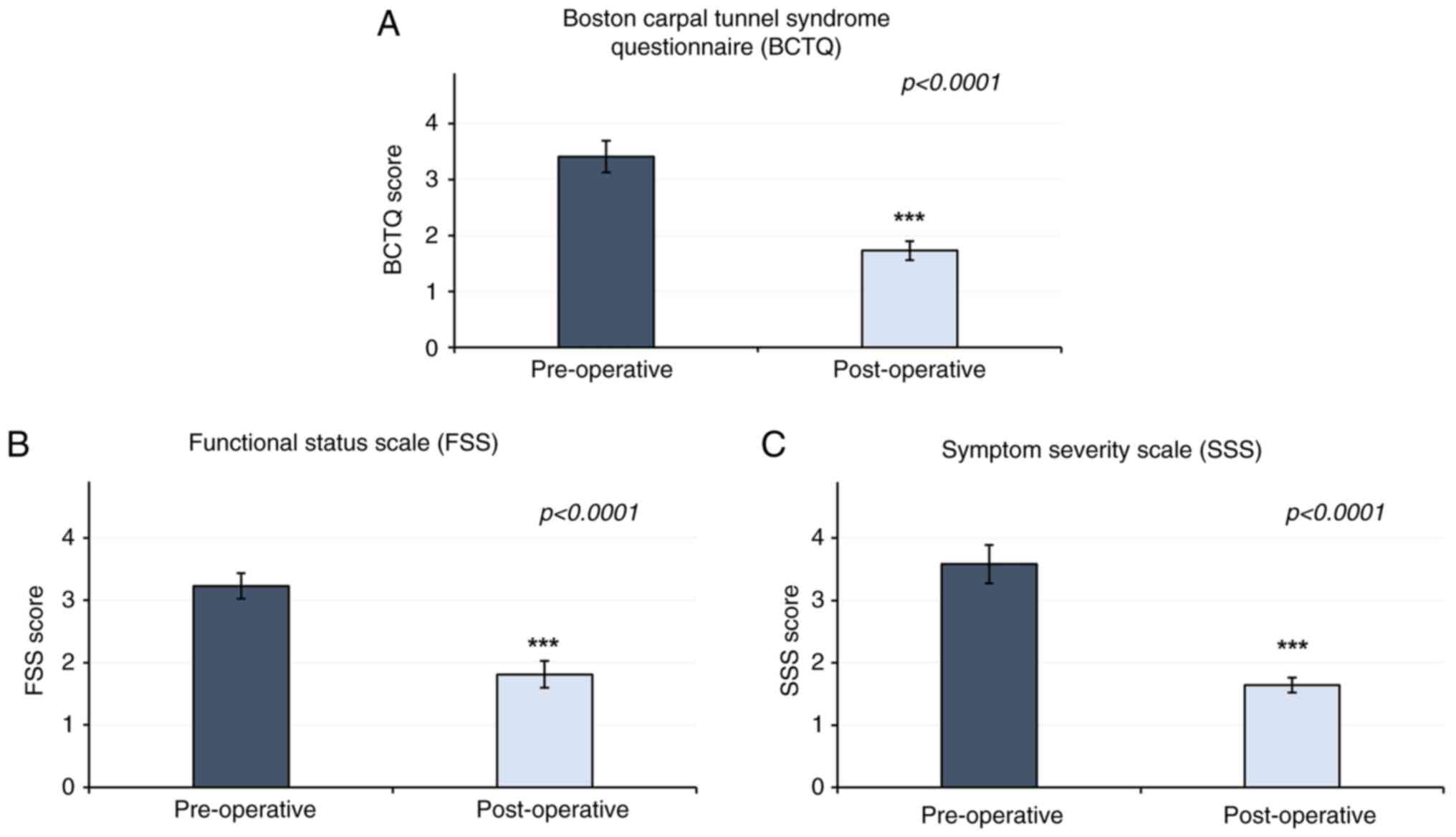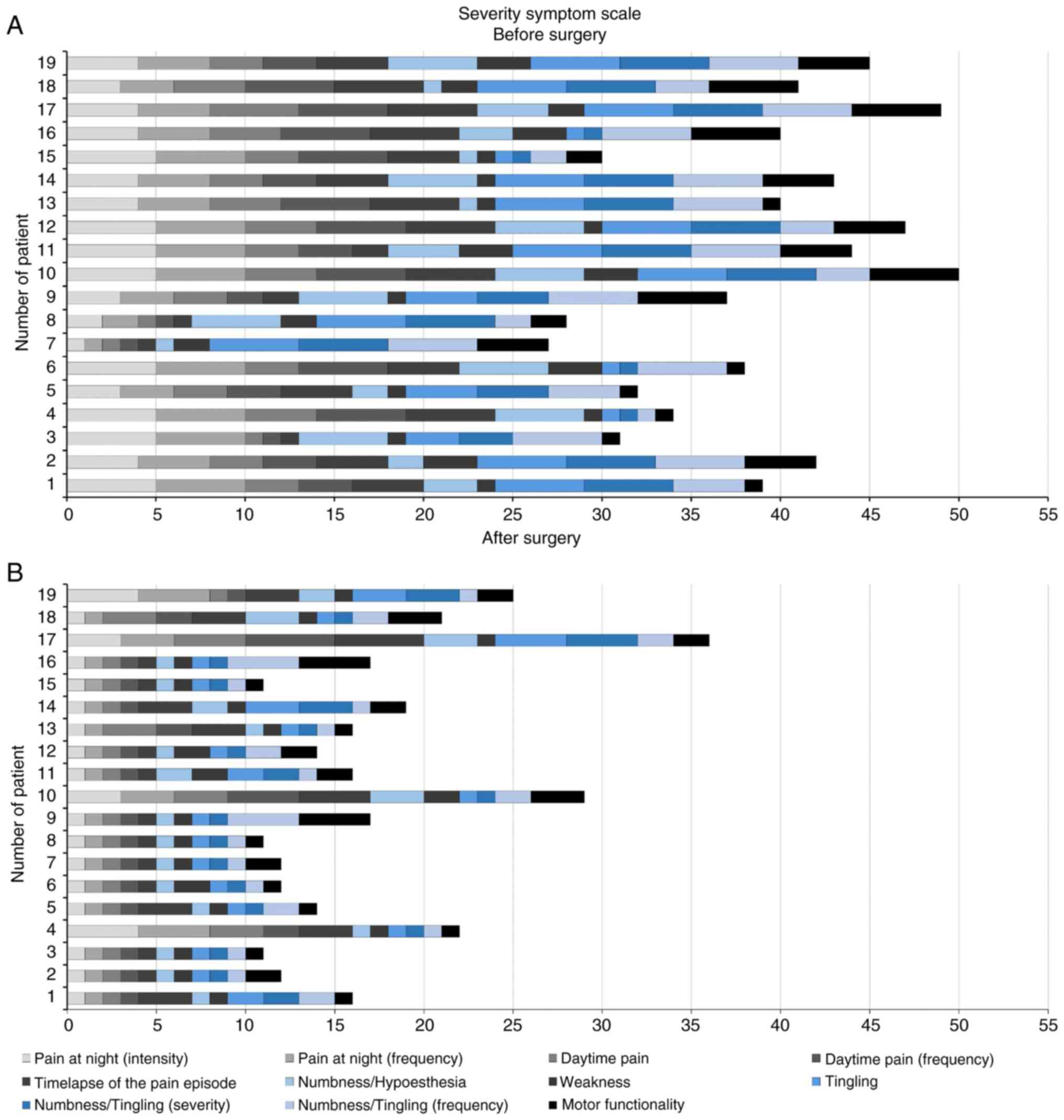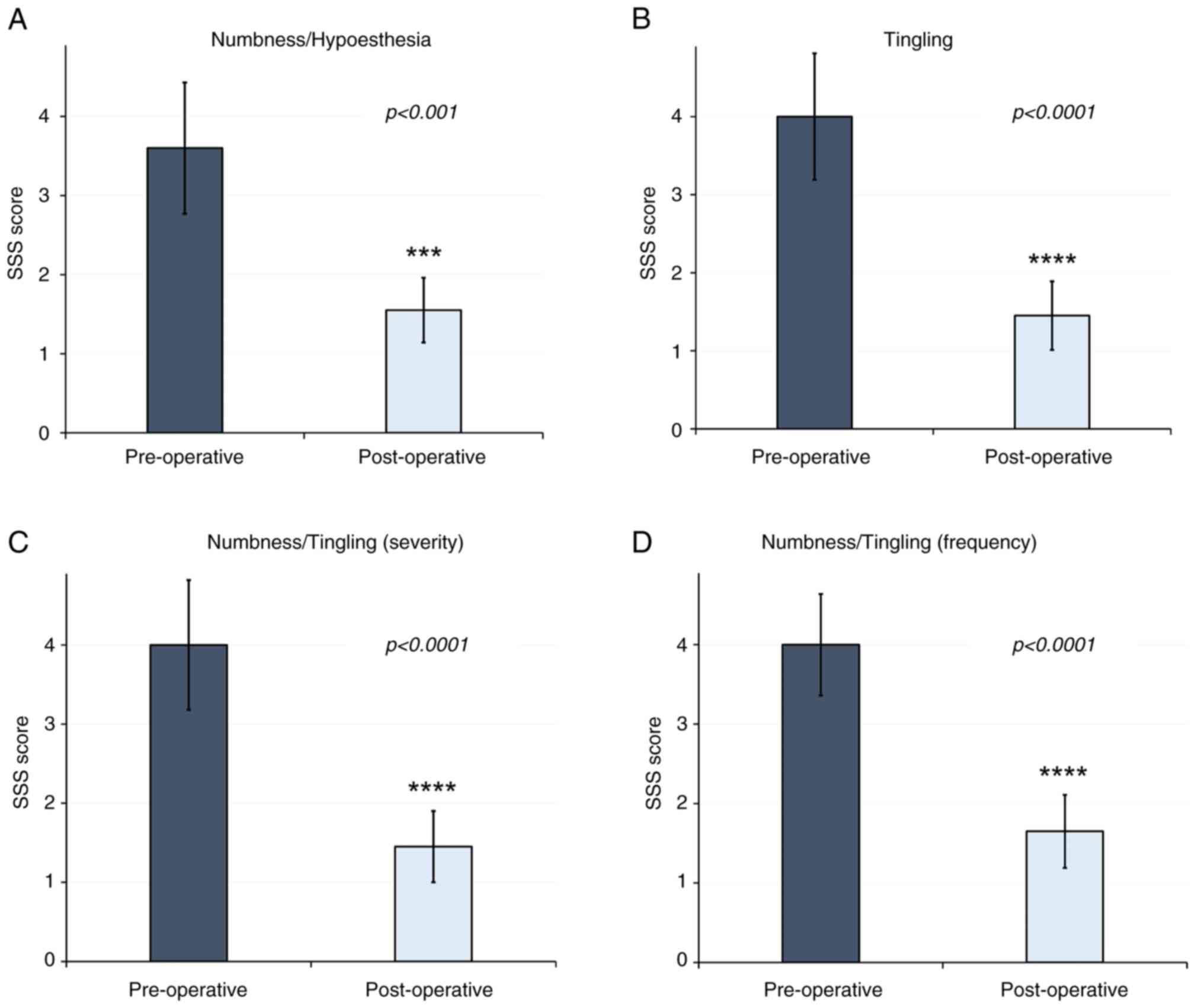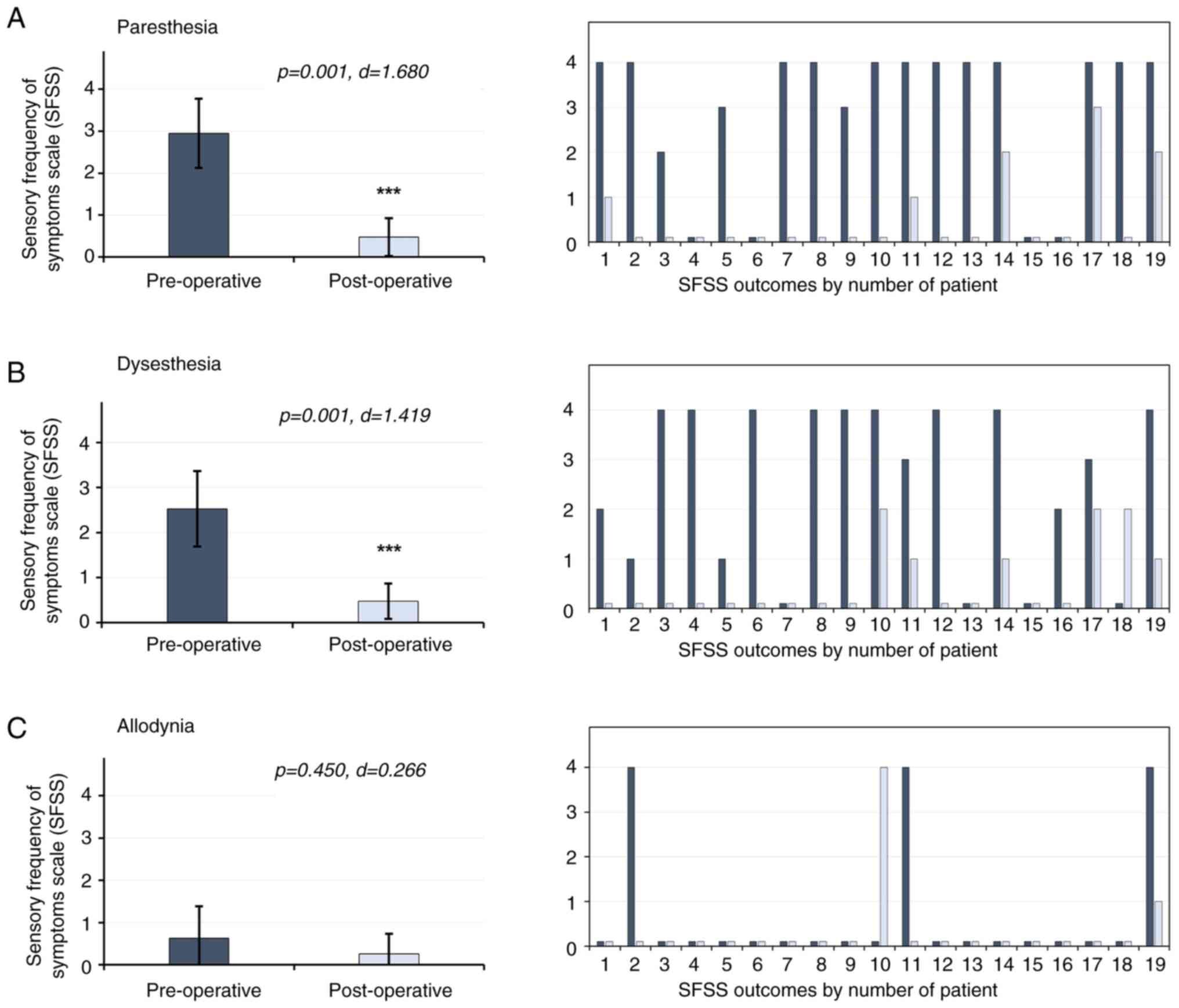|
1
|
Cranford CS, Ho JY, Kalainov DM and
Hartigan BJ: Carpal tunnel syndrome. J Am Acad Orthop Surg.
15:537–548. 2007.PubMed/NCBI View Article : Google Scholar
|
|
2
|
Urits I, Gress K, Charipova K, Orhurhu V,
Kaye AD and Viswanath O: Recent Advances in the understanding and
management of carpal tunnel syndrome: A comprehensive review. Curr
Pain Headache Rep. 23(70)2019.PubMed/NCBI View Article : Google Scholar
|
|
3
|
Colloca L, Ludman T, Bouhassira D, Baron
R, Dickenson AH, Yarnitsky D, Freeman R, Truini A, Attal N,
Finnerup NB, et al: Neuropathic pain. Nat Rev Dis Primers.
3(17002)2017.PubMed/NCBI View Article : Google Scholar
|
|
4
|
Doyle JR and Carroll RE: The carpal tunnel
syndrome. A review of 100 patients treated surgically. Calif Med.
108:263–267. 1968.PubMed/NCBI
|
|
5
|
Pal B: 10-min consultation: Paraesthesia.
BMJ. 324(1501)2002.PubMed/NCBI View Article : Google Scholar
|
|
6
|
Jensen TS and Finnerup NB: Allodynia and
hyperalgesia in neuropathic pain: Clinical manifestations and
mechanisms. Lancet Neurol. 13:924–935. 2014.PubMed/NCBI View Article : Google Scholar
|
|
7
|
Meyers A, Annunziata MJ, Rampazzo A and
Bassiri Gharb B: A systematic review of the outcomes of carpal
ligament release in severe carpal tunnel syndrome. J Hand Surg Am.
48:408.e1–408.e18. 2023.PubMed/NCBI View Article : Google Scholar
|
|
8
|
Levine D, Simmons B, Koris MJ, Daltroy LH,
Hohl GG, Fossel AH and Katz JN: A self-administered questionnaire
for the assessment of severity of symptoms and functional status in
carpal tunnel syndrome. J Bone Joint Surg Am. 75:1585–1592.
1993.PubMed/NCBI View Article : Google Scholar
|
|
9
|
Hudak PL, Amadio PC and Bombardier C:
Development of an upper extremity outcome measure: the DASH
(disabilities of the arm, shoulder and hand) [corrected]. The upper
extremity collaborative group (UECG). Am J Ind Med. 29:602–608.
1996.PubMed/NCBI View Article : Google Scholar
|
|
10
|
Beaton DE, Wright JG and Katz JN: Upper
Extremity Collaborative Group. Development of the QuickDASH:
Comparison of three item-reduction approaches. J Bone Joint Surg
Am. 87:1038–1046. 2005.PubMed/NCBI View Article : Google Scholar
|
|
11
|
García-Jeronimo AI, Armas-Salazar A,
García-Muñoz L, Navarro-Olvera JL, Esqueda-Liquidano MA and
Carrillo-Ruiz JD: Neuropathic pain and positive sensory symptoms in
brachial plexus neuropathy: An exploratory study of outcomes after
surgical decompression and proposal of a new sensory frequency of
symptoms scale. J Integr Neurosci. 22(25)2023.PubMed/NCBI View Article : Google Scholar
|
|
12
|
Chiarotto A, MaxwellL J, Ostelo RW, Boers
M, Tugwell P and Terwee CB: Measurement properties of visual
analogue scale, numeric rating scale, and pain severity subscale of
the brief pain inventory in patients with low back pain: A
systematic review. J Pain. 20:245–263. 2019.PubMed/NCBI View Article : Google Scholar
|
|
13
|
James MA: Use of the medical research
council muscle strength grading system in the upper extremity. J
Hand Surg Am. 32:154–156. 2007.PubMed/NCBI View Article : Google Scholar
|
|
14
|
Tindall S: Chronic injuries of periphereal
nerves entrapment. In: Youmans Neurological Surgery. Vol 3. 4th
edition. Saunders Co., Dundee OR, 1996.
|
|
15
|
Lu YT, Deol AK and Sears ED: The
association between electrodiagnostic severity and treatment
recommendations for carpal tunnel syndrome. J Hand Surg Am.
46:92–98. 2021.PubMed/NCBI View Article : Google Scholar
|
|
16
|
Keith MW, Masear V, Chung KC, Maupin K,
Andary M, Amadio PC, Watters WC III, Goldberg MJ, Haralson RH III,
Turkelson CM, et al: American academy of orthopaedic surgeons
clinical practice guideline on diagnosis of carpal tunnel syndrome.
J Bone Joint Surg Am. 91:2478–2479. 2009.PubMed/NCBI View Article : Google Scholar
|
|
17
|
Maggard MA, Harness NG, Chang WT, Parikh
JA, Asch SM and Nuckols TK: Carpal Tunnel Quality Group.
Indications for performing carpal tunnel surgery: Clinical quality
measures. Plast Reconstr Surg. 126:169–179. 2010.PubMed/NCBI View Article : Google Scholar
|
|
18
|
Choi SJ and Ahn DS: Correlation of
clinical history and electrodiagnostic abnormalities with outcome
after surgery for carpal tunnel syndrome. Plast Reconstr Surg.
102:2374–2380. 1998.PubMed/NCBI View Article : Google Scholar
|
|
19
|
al-Qattan MM, Bowen V and Manktelow RT:
Factors associated with poor outcome following primary carpal
tunnel release in non-diabetic patients. J Hand Surg Br.
19:622–625. 1994.PubMed/NCBI View Article : Google Scholar
|
|
20
|
DeStefano F, Nordstrom DL and Vierkant RA:
Long-term symptom outcomes of carpal tunnel syndrome and its
treatment. J Hand Surg Am. 22:200–210. 1997.PubMed/NCBI View Article : Google Scholar
|
|
21
|
Nau HE, Lange B and Lange S: Prediction of
outcome of decompression for carpal tunnel syndrome. J Hand Surg
Br. 13:391–394. 1988.PubMed/NCBI View Article : Google Scholar
|
|
22
|
Katz JN, Gelberman RH, Wright EA,
Abrahamsson SO and Lew RA: A preliminary scoring system for
assessing the outcome of carpal tunnel release. J Hand Surg Am.
19:531–538. 1994.PubMed/NCBI View Article : Google Scholar
|
|
23
|
Katz JN and Stirrat CR: A
self-administered hand diagram for the diagnosis of carpal tunnel
syndrome. J Hand Surg Am. 15:360–363. 1990.PubMed/NCBI View Article : Google Scholar
|
|
24
|
Chung KC, Hamill JB, Walters MR and
Hayward RA: The michigan hand outcomes questionnaire (MHQ):
Assessment of responsiveness to clinical change. Ann Plast Surg.
42:619–622. 1999.PubMed/NCBI View Article : Google Scholar
|
|
25
|
Bland JD: The value of the history in the
diagnosis of carpal tunnel syndrome. J Hand Surg Am. 25:445–450.
2000.PubMed/NCBI View Article : Google Scholar
|
|
26
|
Giannini F, Cioni R, Mondelli M, Padua R,
Gregori B, D'Amico P and Padua L: A new clinical scale of carpal
tunnel syndrome: Validation of the measurement and
clinical-neurophysiological assessment. Clin Neurophysiol.
113:71–77. 2002.PubMed/NCBI View Article : Google Scholar
|
|
27
|
Kamath V and Stothard J: A clinical
questionnaire for the diagnosis of carpal tunnel syndrome. J Hand
Surg Am. 28:455–459. 2003.PubMed/NCBI View Article : Google Scholar
|
|
28
|
Wainner RS, Fritz JM, Irrgang JJ, Delitto
A, Allison S and Boninger ML: Development of a clinical prediction
rule for the diagnosis of carpal tunnel syndrome. Arch Phys Med
Rehabil. 86:609–618. 2005.PubMed/NCBI View Article : Google Scholar
|
|
29
|
Lo JK, Finestone HM and Gilbert K:
Prospective evaluation of the clinical prediction of
electrodiagnostic results in carpal tunnel syndrome. PM R.
1:612–619. 2009.PubMed/NCBI View Article : Google Scholar
|
|
30
|
Caliandro P, Giannini F, Pazzaglia C,
Aprile I, Minciotti I, Granata G, Tonali P and Padua L: A new
clinical scale to grade the impairment of median nerve in carpal
tunnel syndrome. Clin Neurophysiol. 121:1066–1071. 2010.PubMed/NCBI View Article : Google Scholar
|
|
31
|
Atroshi I, Lyrén PE, Ornstein E and
Gummesson C: The six-item CTS symptoms scale and palmar pain scale
in carpal tunnel syndrome. J Hand Surg Am. 36:788–794.
2011.PubMed/NCBI View Article : Google Scholar
|
|
32
|
Garland H, Bradshaw JP and Clark JM:
Compression of median nerve in carpal tunnel and its relation to
acroparaesthesiae. Br Med J. 1:730–734. 1957.PubMed/NCBI View Article : Google Scholar
|
|
33
|
Heathefield KW: Acroparaesthesiae and the
carpal-tunnel syndrome. Lancet. 273:663–666. 1957.PubMed/NCBI View Article : Google Scholar
|
|
34
|
Opit LJ and Rieger RA: Acroparesthesia and
the ‘carpal tunnel syndrome’. Aust N Z J Surg. 32:59–65.
1962.PubMed/NCBI View Article : Google Scholar
|
|
35
|
Seze D and Phankim-Koupernik M:
Acroparesthesias and carpal canal syndrome. Rev Rhum Mal
Osteoartic. 29:244–251. 1962.PubMed/NCBI(In French).
|
|
36
|
Wintman BI, Winters SC, Gelberman RH and
Katz JN: Carpal tunnel release. Correlations with preoperative
symptomatology. Clin Orthop Relat Res. 135–145. 1996.PubMed/NCBI
|
|
37
|
Duchateau JA and Moermans JP: Carpal
tunnel syndrome: Postsurgical course of symptoms. Ann Chir Main.
3:227–231. 1984.PubMed/NCBI View Article : Google Scholar
|
|
38
|
Aydin M, Argun G, Acar B, Arikan M, Toğral
G, Cinaroglu S, Mert A and Demi Rtas M: Residual symptoms after
carpal tunnel decompression and treatment with gabapentin: A
multicenter study. Cureus. 13(e17638)2021.PubMed/NCBI View Article : Google Scholar
|
|
39
|
Rose EH: The use of the palmaris brevis
flap in recurrent carpal tunnel syndrome. Hand Clin. 12:389–395.
1996.PubMed/NCBI
|
|
40
|
Phalen GS: The carpal-tunnel syndrome.
Seventeen years' experience in diagnosis and treatment of six
hundred fifty-four hands. J Bone Joint Surg Am. 48:211–228.
1996.PubMed/NCBI
|
|
41
|
Assmus H, Dombert T and Staub F:
Reoperations for CTS because of recurrence or for correction.
Handchir Mikrochir Plast Chir. 38:306–311. 2006.PubMed/NCBI View Article : Google Scholar : (In German).
|
|
42
|
Zhou L: Small fiber neuropathy. Semin
Neurol. 39:570–577. 2019.PubMed/NCBI View Article : Google Scholar
|
|
43
|
Lolignier S, Eijkelkamp N and Wood JN:
Mechanical allodynia. Pflugers Arch. 467:133–139. 2015.PubMed/NCBI View Article : Google Scholar
|
|
44
|
Wright JG and Feinstein AR: A comparative
contrast of clinimetric and psychometric methods for constructing
indexes and rating scales. J Clin Epidemiol. 45:1201–1218.
1992.PubMed/NCBI View Article : Google Scholar
|















